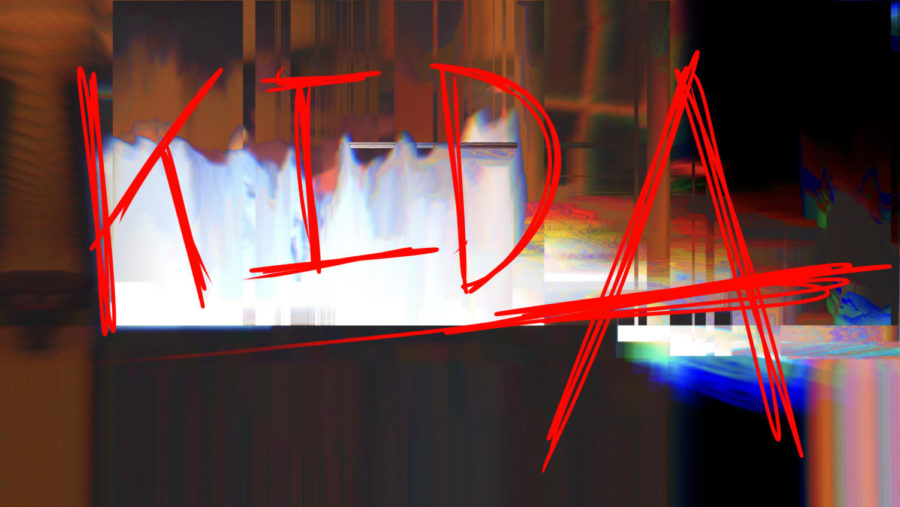Album review of Radiohead’s Kid A
People today do not get to experience a lot of underground music because they are either too busy or lack the motivation to search around for other than mainstream music. A group like Radiohead has made masterpiece after masterpiece. Not mentioning their work to those unfamiliar with their music might doom them to never experiencing music they may really enjoy.
Radiohead
Radiohead is an English rock band from Abingdon, Oxfordshire, England. The group formed in 1985 and produced their first album, Pablo Honey, in 1993 and their latest album, A Moon Shaped Pool, in 2016. Radiohead has produced several very successful albums, such as The Bends, OK Computer, Kid A, and In Rainbows. OK Computer is considered Radiohead’s best album. It expresses themes, as stated by Hall High School’s Alfredo Grado through an email interview, of “social indifference, angst, curiosity, isolation, yearning, ones struggle to stand out or fit in, it also took on technology and societies increasing dependency of it….” I also asked Grado if the theme of paranoia and isolation in Kid A is still relevant today. He wittingly replied “Have you ever forgot or lost your cell phone?”
Background of Kid A
After extensive touring with Radiohead’s explosively successful third album, Thom Yorke and the band felt burnt out from so much performing. Yorke developed a writer’s block. He felt under a lot of pressure that caused anxiety during the OK Computer tour. Somehow this inspired him to write Kid A with How to Disappear Completely being a perfect example of Yorke’s feelings during the tour. The lyrics for each track were randomly pulled out of a hat and included personal experiences from members of the group. They began to use synthesizers to create new sounds.
There has been much debate in the music world about the meaning of Kid A. But according to Yorke through interviews, he has said it is “…based on the idea that, somewhere, some errant scientist has already created the first completely genetically cloned baba – Kid A. I’m sure its happened. I’m sure somewhere it’s already been done, even though it’s illegal now” (Genius).
A lot of other people also seem to believe that – along with Kid A being the first human clone – that the character is living in this world which has been completely taken over by technology and the internet. Looking back onto OK Computer and its messages of the rise of the computer company and the album Kid A being leaked onto the internet before its release for promotional purposes, that interpretation is highly plausible. Either way, this album is about depression and sadness and listeners can interpret whatever they want with it.
With Radiohead transitioning out of rock music by “fusing the very sad and melancholy songwriting they were known for with a lot of other music styles…” (Fantano), people were either thrilled or turned off by the new sound Radiohead produced. The songs on Kid A are a lot more diverse and can sound differently track to track. Radiohead does not completely get rid of the guitar, rather the guitar has a different usage; any track that is played with instruments has repetition and looping, like tracks such as The National Anthem, Optimistic, In Limbo, and Morning Bell.
The album also shifts in and out of becoming robotic and human with the vocals and the sounds of the track, which could be a reason behind the sadness of this album. Human emotions are being expressed in this world taken over by technology. That causes a feeling of sadness beyond what is to be expressed in the lyrics.

Thom Yorke of Radiohead performing on the Pyramid Stage, at the Glastonbury Festival.
Track 1: Everything in Its Right Place
The opening track of Kid A starts with very gripping and cold synths with lyrics talking about sadness and change. “Yesterday I woke up sucking a lemon” is a line that’s repeated saying how “…Yorke creates a metaphor where he and the people of the world wake up sad and angered with their face twisted as if they had sucked on a lemon” (Genius). This track also has distorted forward and reversed robotic vocals of Yorke’s voice throughout the track which gives off the feeling of being shown a world completely taken over by technology.
Track 3: The National Anthem
Thom Yorke’s vocals become less robotic and more human than the previous track with the powerful National Anthem. The heavy guitar created a nice beat and the track goes into a free form jazz fest with blaring horns, a loud saxophone, crashing cymbals, and the trumpets filling in the background. This track is very overwhelming but such a good jam to listen to. Move over Lady Gaga, we’ve gonna sing this National Anthem at the Super Bowl!
Track 4: How to Disappear Completely
As if this title doesn’t sound sad enough, after the very energetic National Anthem, the album brings us to a sad low. This track has a signature sound of a looming string section in the background that sounds like a big sigh while Yorke says “I’m not here” and “This isn’t happening.” Yorke describes himself as experiencing and seeing “[s]trobe lights [a]nd blown speakers[,] [f]ireworks [a]nd hurricanes” and only wants to get out of there. He acts like “[s]omething snapped in [him]. [He] just said, ‘That’s it. I can’t take it anymore.’ And more than a year later, [they] were still on the road. [He] hadn’t had time to address things. The lyrics came from something Michael Stipe said to [him]. [He] rang him and said, ‘I cannot cope with this.’ And he said, ‘Pull the shutters down and keep saying, ‘I’m not here, this is not happening’” (Genius).
Track 6: Optimistic
After the ambient interlude of Treefinger, the album enters a state where it tries to exit the depression it put itself into by saying “You can try the best you can[.] The best you can is good enough.” This track got a lot more radio time than Idioteque most likely due to the Britrock feel it has to it. Optimistic talks about Darwinism and the post-apocalyptic world Kid A musically describes itself, where big companies keep smashing smaller companies out of business just to stay on top.
Track 8: Idioteque
Idioteque acts a chaotic rush back to the electonia from the first part of the album. The album wakes the listener up from the previous track and sends a message. It does so in an ominous sense that the world is becoming digitized with the line “Ice Age coming, Ice Age coming” as if the world is going to become cold or frozen like a lifeless computer. The track is almost like an emergency siren because of how immediate the track plays and the rush of feeling like you came out of a sleep to a world that’s pretty much gone.
Track 10: Motion Picture Soundtrack
The final track of the album wraps up with harps and an organ to have a bittersweet and somewhat warm end to such a depressing album. In the middle it says how life is “not like the movies,” and “[t]hey fed us on little white lies.” And the final line “I’ll see you in the next life” ends the album right there; people have discussed what this final line could mean: maybe it’s Radiohead saying goodbye and see you in the next album, a lover saying goodbye to someone, or Kid A the first human clone going to Heaven saying he’ll be reincarnated.
Kid A provides a heavy amount of feeling in its instrumentation, rhythm, and lyrics – such a heavy amount of feelings that you cannot refuse to ignore due to how powerful the feelings are. The album has a lot of psychedelic rock to it and experimentation; not the kind of experimentation where Radiohead takes a bunch of sound effects and off-key notes and mash them together to the point of being unlistenable; rather, experimentational by articulating the sounds into something enjoyable. Kid A is still a very popular album, a lot of people still love it and maybe you’ll like it too. Give it a listen and feel the enveloping power of sad and emotions.

